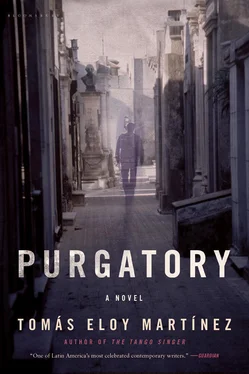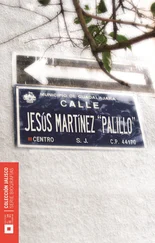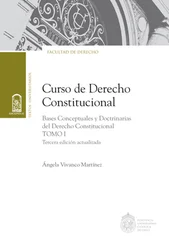‘I told the doctor everything,’ Emilia said. ‘ Mamá won’t be coming back until after you’re married. And she won’t be coming back permanently. She just needs to come home from time to time for short periods. You won’t even know she’s here. I’ll look after her, and if I’m not here, we’ll bring in a nurse.’
She was still working as a cartographer for the Automobile Club. She earned a pittance but enough for her to live modestly without having to rely on her father. If she had known at the time that every month Dupuy deposited a sum equal to her salary into her account, she would have thrown it back in his face. When she was asked to work overtime, she gratefully accepted even though the money was pitiful. She was making plans to go out into the world to search for Simón. She would close her eyes and indicate a point on the map, telling herself that this was the place where her husband was hiding, the place from which he would return. She was hoping for a chance revelation, just as Bible readers hope to find illumination in the first line they happen on.
Contrary to what Emilia expected, Dupuy did not reject the doctor’s recommendation out of hand. He said that he would think about it and make his decision the following evening. His daughter never knew who he spoke to during those hours, nor how he came to the conclusion she least expected. Her only thought was that, at a time marked by frequent social gatherings, single men were the subject of gossip. More than once, the Eel had said that though he sympathised with Dupuy over Ethel’s illness, nobody understood why he didn’t simply take his daughter to such parties. ‘Emilita is a treasure, we’ve known her since she was a little girl, and she’s a pleasure to talk to. Don’t hide this precious jewel away from us, Doc,’ the admiral agreed. ‘Between us, we’ll teach her to enjoy life.’
Dupuy did not believe his daughter worthy of quite so much attention unless it seemed she was basking in his reflected glory. However, it was not a bad idea to be seen at Mass with her, to take her to the theatre. The comandantes were right. Unaccompanied men aroused suspicion, and the Church would not give its blessing to him remarrying while Ethel was still alive. Emilia was a jewel, why not show her off?
He summoned both his daughters and told them that he would not object to their mother coming home to stay occasionally only if Emilia would agree to move back into the family home to look after her, and give up the fantasies that had her languishing in San Telmo and agree to be his escort when he asked her.
Chela became alarmed.
‘Don’t worry about anything. Your wedding comes first — after that we can think about bringing her home. As your sister says, there’s no reason not to, it’s only for a couple of days a month. I can’t see why you would have a problem with it since you won’t be living here.’
He turned to Emilia.
‘But I don’t want any problems either. While she’s in this house, Ethel will have to stay in her room like the vegetable she is. If I see her or hear her, I’m sending her straight back to the home.’
‘What about my job?’ asked Emilia.
‘You’ll have to gradually give up working. Make up your mind: either you look after your mother, or we go back to the way things were.’
‘But a nurse—’ she managed to protest.
‘I’ve thought about this carefully,’ Dupuy interrupted her. ‘I am not prepared to tolerate strangers in my house.’
What Emilia had not expected was the trap she had set for herself. Love and good intentions had forced her to trade one cell for another; this one, her father’s, was the bitterest.
She would forget her troubles by burying herself in her work. She needed every penny she could make, needed it desperately so that one day she would be able to leave. She was a married woman, an adult. She had to throw off this yoke. She no longer even knew how to find her way around this city, a city she had once moved through heedlessly with Simón on her arm. What had been a street two years before was now fences and rubble; beneath the houses tunnels opened up, and in some places the Buenos Aires of the past seemed to have come back to life, watering troughs, horse-drawn carriages and hitching posts, things she believed had disappeared forever. Almost daily the Automobile Club redrew the maps of whole neighbourhoods, scarred by a network of motorways that was being built. She told them that she would have to take care of her mother and that soon she would only be able to work part-time. A number of areas needed to be remapped and she was lucky to be assigned Parque Chacabuco, where her mother’s nursing home was. She would take her time, visit her every now and then, and gradually tell her the good news. ‘ Mamá , we’re going to be sleeping in the same room again, like we used to,’ she would tell her, ‘I’m going to take care of you again.’ She had to make the most of these conversations about the world outside, which was changing so quickly.
Buenos Aires was different now: the newspapers called it progress, but the only progress Emilia could see was the steady advance of misery. The mayor had refugees forcibly evicted from the makeshift shanty towns. If they resisted, he had the electricity and water cut off. Tanks would burst through the walls of houses, rolling implacably over mattresses, stoves, half-cooked meals. She would not tell her about that, she would tell her simply that almost nothing was where it had been.
The area assigned to Emilia was a network of short streets and narrow tree-lined alleys: a corner of the city condemned to death. In a few short months, cartographers would have to draw their maps, fill in the blank spaces currently bounded by dotted lines. It was Monday. The heavy rains of the previous week had alleviated the sweltering January heat. Emilia got off the bus and walked across the park. She walked self-consciously, knowing that she was being watched but unable to tell from where. Perhaps from the porches, the balconies, the roofs of the houses. Her father always said that the best watchmen were those who never let themselves be seen, and she saw no one but she was certain she was being watched, she could feel eyes boring into the back of her neck. She stared at the little map she took from her bag. The alleys spread out in a fan on one side of the park: their names — Science, Good Order, Progress, Commerce — the last embers of positivism. She took out her drawing pad and prepared to makes notes. A sudden noise startled her. Behind her, a huge wrecking ball smashed through the wall of a nearby house, throwing up a cloud of dust and debris that settled on a family having lunch on a piece of rubble-strewn waste ground. The table was set: a chequered tablecloth, ruined milanesas covered with gravel and brick dust. The man sitting at the head of the table got up and eyed Emilia warily. ‘Hey, señora, señorita,’ he said, still chewing, his mouth enlivened by a single yellow tooth, ‘are you here from the council about the census?’ ‘I don’t know anything about that,’ said Emilia. ‘I’m making a map of the area.’ ‘Oh, you’re from the land registry, it’s the same thing. Could you find out for us when they’re going to pay for the expropriation? They said they were going to send the money today, said there would be vans to take us to a new house, but nothing’s happened, we’ve been waiting since first thing this morning. Our neighbours here left last week’ — he threw his arms wide, gesturing to the waste ground — ‘and those behind here have already been paid. You can see how we have to live. It’s hell. Some people were lucky, they were given a month to leave. They tell me it could have been worse. An old woman in the Pasaje de las Garantías dropped dead when she saw the trucks rolling in. Fifty years she’d lived in the same place, cooked her meals in the same kitchen; she was the last to leave, she stayed behind to watch the collapsing roofs, the chicken coop, the plants in the garden.’
Читать дальше












